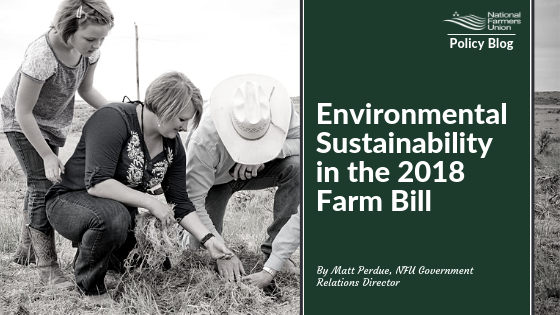 By Matt Perdue, NFU Government Relations Director
By Matt Perdue, NFU Government Relations Director
Environmental sustainability is critical for the future of family farming and ranching and for the health of our rural communities. As concerns over water quality, soil health and the wide-ranging effects of climate-change mount, incentives-based conservation programs are more important now than ever. The 2018 Farm Bill maintains and improves the tools that family farmers and ranchers need to continue their long-standing role as stewards of our nation’s natural resources.
Increasing acreage for the Conservation Reserve Program (CRP) was among NFU’s top priorities for the farm bill. The popular program is currently at its lowest acreage level since 1988, limiting opportunities for new enrollments in many states. The Farm Bill increases CRP acreage levels from 24 million to 27 million acres by 2023 and includes common-sense reforms to rein in excessive program rental payments. Included within the increased CRP acreage is up to 50,000 acres for the Soil Health and Income Protection Pilot Program (SHIPP). SHIPP will give farmers in the prairie pothole region a new, short-term, flexible land-idling option to improve soil, water and wildlife resources on their least productive land.
NFU devoted much of our efforts defending against proposals to eliminate the Conservation Stewardship Program (CSP). CSP and the Environmental Quality Incentives Program (EQIP), provide farmers and ranchers the tools they need to improve natural resource management on working agricultural lands. The incentives-based CSP was ultimately maintained and “monetized,” transitioning from its previous acreage-based structure to an annual funding allocation. CSP also included a number of reforms to streamline coordination with EQIP, provide a new supplemental payment for advanced grazing management, and increase the value of supplemental payments.
While overall funding for conservation programs was preserved, funding was shifted away from CSP to other priorities within the conservation title. EQIP, the Regional Conservation Partnership Program (RCPP) and the Agricultural Conservation Easement Program (ACEP), each received a significant funding increase. Several reforms were made to each program, including the authorization of a Conservation Planning Assessment within EQIP. This new provision will serve as a gateway to conservation by providing producers with an assessment of cropland or rangeland function and recommending beneficial conservation activities for that operation.
The new Farm Bill also leverages a handful of existing programs to help farmers and ranchers better address the impacts of climate change on their operations. “Weather volatility mitigation and adaptation” is added to the eligible activities and purposes for CSP and EQIP. A new Soil Health Demonstration Trial was created to provide incentives for new soil carbon sequestration practices and to establish protocols for measuring soil carbon levels. The new Carbon Utilization and Biogas Education Program, is also included among the bill’s energy programs.
Overall, the 2018 Farm Bill shuffles priorities, but maintains and improves programs that help family farmers and ranchers improve their environmental stewardship. In the coming months, new programs and provisions will begin to move through federal rule-making processes and to implementation. As we work with the U.S. Department of Agriculture on this phase of the farm bill process, NFU will provide updates on program application deadlines and other key programmatic information.
Like what you’ve read? Join the conversation at National Farmers Union’s Facebook page.

